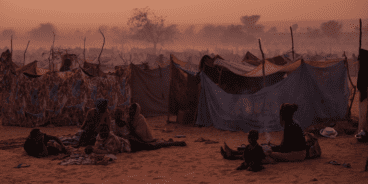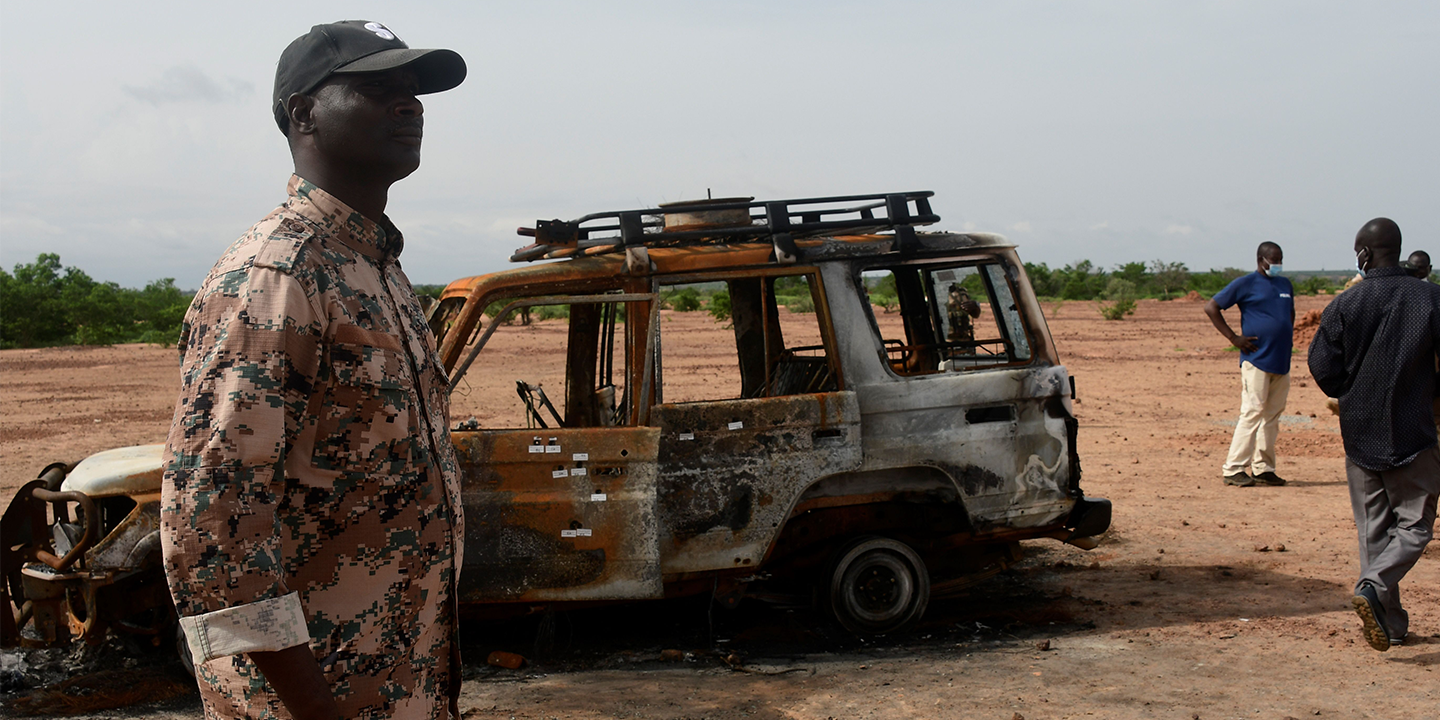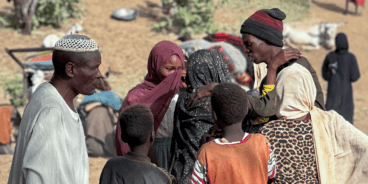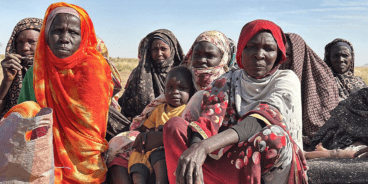

Atrocity Alert No. 247: Sudan, Central Sahel and the ICC
Atrocity Alert is a weekly publication by the Global Centre for the Responsibility to Protect highlighting situations where populations are at risk of, or are enduring, mass atrocity crimes.
Dozens killed during inter-communal clashes in West Darfur
At least 87 people have been killed and 191 injured since violence broke out between the Arab Rizeigat and Masalit communities on Saturday, 3 April, around the city of El Geneina in West Darfur, Sudan. Members of both communities mobilized local militias after two members of the Masalit community were killed by unidentified armed men. Heavy weaponry and rocket-propelled grenades were reportedly used, hitting a hospital and a UN compound. A local power station has been destroyed and there is currently no electricity in the area.
In response, Sudan’s transitional authorities declared a state of emergency in West Darfur and deployed troops to the region to restore stability. The UN Office for the Coordination of Humanitarian Affairs reports that all humanitarian operations have been suspended and local food markets remain closed until the security situation improves.
The UN Special Representative for Sudan and Head of the newly established UN Integrated Transition Assistance Mission, Volker Perthes, urged all parties to immediately end the fighting. The Special Representative also emphasized that, “security forces should be seen to act in the interest of peace and to protect all civilians, in full compliance with international human rights standards and regardless of tribal or ethnic affiliations.”
Sporadic clashes between Arab and Masalit communities near El Geneina have dramatically escalated since the beginning of this year. During January similar clashes resulted in at least 155 people being killed. According to the UN, 108,000 internally displaced people residing in the Krinding camps in West Darfur were also forced to flee because of the violence.
This Sunday, 11 April, marks two years since mass protests resulted in the overthrow of Sudan’s former military dictator, Omar al-Bashir. While Sudan has undergone significant political changes since 2019, its democratic transition remains fragile. The transitional authorities must take immediate steps to disarm armed groups and ethnic militias, ensure justice for past atrocities, and provide effective protection to all vulnerable populations in Darfur.
Counterterrorism, airstrikes and civilian casualties in the Central Sahel
A report released on 30 March by the UN peacekeeping mission in Mali (MINUSMA) concluded that a January airstrike by France’s regional counterterrorism force, Operation Barkhane, killed 19 civilians who were attending a wedding in Bounti, central Mali. The investigation determined that the airstrike also killed three suspected members of an armed Islamist group, Katiba Serma. In response, the French Ministry of the Armed Forces said it “strongly reaffirms” that the airstrike only targeted an “armed terrorist group” and expressed concern regarding the “methodology” of the MINUSMA report, claiming it used “unverifiable” testimony from local witnesses. Days before the report was released, Malian authorities blamed another French airstrike for the death of six civilians in Gao, northeastern Mali.
The deteriorating security situation in the Central Sahel has its origins in the actions of armed Islamist groups who continue to attack state institutions, local security forces and vulnerable civilian populations. Although Sahelian governments and their international partners have launched numerous military operations to combat armed Islamist groups in Burkina Faso, Mali and Niger, the MINUSMA report exposes the deadly impact the conflict continues to have on innocent civilians.
For example, on Friday, 2 April, Niger’s National Human Rights Commission released preliminary findings from its investigation in Tera, Tillabéri region, determining that Chadian troops belonging to the G5 Sahel Joint Force (FC-G5S) recently raped several women and an 11-year-old girl. The women, including one who is pregnant, were raped in front of their husbands who were held at gunpoint by the soldiers.
The FC-G5S and Chad’s foreign ministry released statements on 3 April acknowledging the abuses and stating that the accused soldiers will face disciplinary proceedings. A criminal investigation will also be opened and the victims will receive support.
Christine Caldera, Research Analyst at the Global Centre for the Responsibility to Protect, said that, “the protection of civilians must be paramount for all forces operating in the Central Sahel. All parties to the conflict must strictly comply with International Humanitarian Law, hold perpetrators of abuses to account, and work to prevent further atrocities.”
Sanctions and reparations at the International Criminal Court
Since 2002 the International Criminal Court (ICC) has provided access to justice for victims of war crimes, genocide and crimes against humanity. On 2 April the United States (US) finally rescinded Executive Order #13928, repealing sanctions levied against Chief Prosecutor Fatou Bensouda and other ICC officials. Former President Donald Trump imposed these punitive sanctions in June 2020 in response to the Court’s opening of an investigation into potential war crimes and crimes against humanity committed in Afghanistan and a preliminary examination into the situation in the Occupied Palestinian Territories.
Meanwhile, on 30 March the ICC’s Trust Fund for Victims and the government of Mali, in collaboration with UNESCO, hosted a ceremony to award symbolic reparations to victims of past atrocities in Timbuktu. Chief Prosecutor Bensouda also visited Timbuktu and spoke about the historic importance of the ICC’s Mali case.
In 2012 armed groups, including Ansar Dine, occupied Timbuktu and enforced a harsh version of sharia law, committing atrocities against civilians and demolishing cultural heritage sites. The government of Mali referred the situation to the ICC in July 2012. Four years later, the ICC sentenced former Ansar Dine leader, Ahmad al-Faqi al-Mahdi, for the war crime of partially destroying religious and historical monuments that were a UNESCO World Heritage Site. In the landmark case, the ICC prosecuted the destruction of cultural heritage as a war crime for the first time.
Last week in Timbuktu Chief Prosecutor Bensouda told the audience, “when cultural property is destroyed, it erases the past, never to be lived again, leading to an irreplaceable loss to humanity.” The intentional destruction of cultural heritage has sometimes been part of systematic campaigns by state forces and non-state armed groups to destroy a targeted population group and its history.
Jaclyn Streitfeld-Hall, Research Director at the Global Centre for the Responsibility to Protect, said that, “the experience of Mali shows that the ICC remains an indispensable part of the global battle to end impunity. While we applaud the US for abandoning its sanctions against the ICC, the Biden administration should now constructively collaborate with the Court. All UN member states should actively support the ICC’s ongoing efforts to hold perpetrators of atrocity crimes accountable under international law.”
Related Content


Atrocity Alert No. 435: Sudan, Israel and the Occupied Palestinian Territory and Democratic Republic of the Congo
